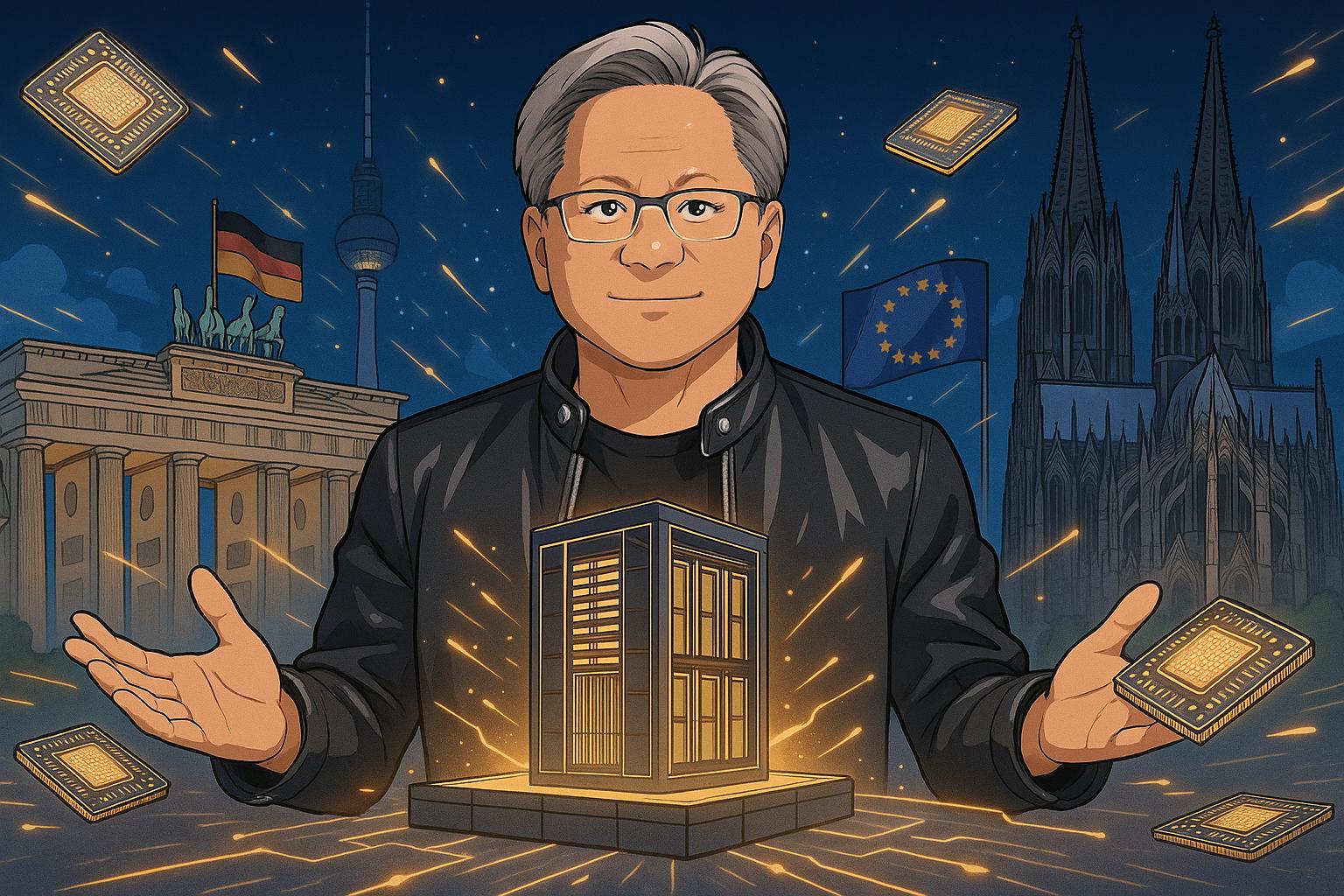Following multi-billion-dollar deals in the Middle East, NVIDIA’s CEO Jensen Huang is driving a strategic pivot to Europe with a landmark AI data centre in Germany featuring 100,000 high-performance chips, signalling a major push to bolster the continent’s AI infrastructure and reduce reliance on Big Tech firms.
NVIDIA’s CEO Jensen Huang is making a strategic pivot towards Europe, following a successful outreach in the Middle East, where the company secured multi-billion-dollar contracts with state-backed enterprises. This shift highlights NVIDIA’s focus on government-backed demand for its AI technologies, moving away from its traditional reliance on Big Tech firms. As reported by Handelsblatt, Huang is set to visit Germany first, with plans to unveil a monumental AI project expected to be centred around a new data centre that utilises a staggering 100,000 of NVIDIA’s high-performance chips, each costing approximately $30,000. This venture could escalate the project cost to around $3 billion just for the chips alone, marking it as Germany’s largest foray into AI.
The urgency for Europe to advance its AI capabilities stems from a desire to remain competitive with nations like the U.S. and China, particularly in the face of burgeoning AI sectors globally. However, a significant hurdle lies in the fact that Europe currently relies heavily on NVIDIA for its chip supply, an issue that needs addressing if the continent is to cultivate an independent tech ecosystem. Huang’s upcoming appearance is expected to coincide with meetings with key German figures, including Vice Chancellor Friedrich Merz, signalling a commitment to addressing these infrastructural challenges.
Moreover, NVIDIA’s initiatives are not confined to Germany. Following his visit there, Huang will attend various tech events in the UK and France, including Tech Week and Vivatech in Paris. During this tour, NVIDIA intends to announce multiple AI projects aimed at enhancing the region’s technological landscape, reinforcing its position as a global leader in AI infrastructure. This aligns with the European Commission’s plans to establish AI gigafactories as part of a broader strategy to invest $20 billion into bringing advanced AI capabilities to Europe. Despite these ambitious plans, critics have voiced concerns over the feasibility and financial viability of such projects, questioning whether substantial public investment in the rapidly evolving technology sector is justified.
A collaborative effort between NVIDIA and German chipmaker Infineon has also been reported. This partnership aims to create advanced power delivery systems for AI data centres, intending to enhance energy efficiency and reduce losses—an essential consideration given the projected power consumption rates for AI infrastructures. These developments are particularly significant as Germany seeks to enhance its technological capabilities while addressing rising energy demands.
With an expanding influence across the Middle East, Europe, and America, NVIDIA is clearly positioning itself at the forefront of the global AI revolution. By capitalising on shifting demand from state-backed entities and forging vital partnerships, the company is not only enhancing its market presence but also playing a crucial role in shaping the AI frontier. As the landscape evolves, NVIDIA’s ventures could very well signify a broader transformation in how nations approach the integration of AI technologies within their frameworks.
 Reference Map:
Reference Map:
Source: Noah Wire Services
- https://wccftech.com/nvidia-next-place-of-business-after-middle-east-is-the-eu/ – Please view link – unable to able to access data
- https://www.reuters.com/business/energy/german-chipmaker-infineon-work-with-nvidia-power-delivery-chips-2025-05-20/ – German chipmaker Infineon announced a collaboration with Nvidia to develop advanced power delivery chips for artificial intelligence (AI) data centers. The partnership focuses on designing high-voltage, direct current (DC) power distribution systems to replace traditional alternating current (AC) systems, aiming to reduce energy losses and improve efficiency. This initiative is particularly significant as AI data centers are projected to consume substantial power, with each server rack expected to require up to a megawatt by the end of the decade. The centralized DC power system is intended to support Nvidia’s sustainability goals while delivering the performance and scalability needed for future AI workloads. ([reuters.com](https://www.reuters.com/business/energy/german-chipmaker-infineon-work-with-nvidia-power-delivery-chips-2025-05-20/?utm_source=openai))
- https://www.reuters.com/technology/artificial-intelligence/if-europe-builds-gigafactories-will-ai-industry-come-2025-03-11/ – The European Commission is planning to raise $20 billion to build four AI gigafactories as part of their strategy to compete with the U.S. and China in artificial intelligence. These data centers, announced by Commission President Ursula von der Leyen, aim to create advanced AI models in compliance with Europe’s stringent AI safety and data protection regulations. However, the initiative faces multiple challenges, including securing the necessary chips and finding suitable sites and sufficient electricity. Critics argue that without significant European cloud services or firms with large customer bases, such extensive investments may be risky. Furthermore, there’s skepticism about whether public funds should be invested in an area where the technology rapidly evolves, requiring frequent expensive upgrades. Potential beneficiaries of this plan include European chipmakers and startups. ([reuters.com](https://www.reuters.com/technology/artificial-intelligence/if-europe-builds-gigafactories-will-an-ai-industry-come-2025-03-11/?utm_source=openai))
- https://www.ft.com/content/530e7eaf-65f3-4168-a546-d49b4a684e7b – Germany’s plan to increase defence spending is leading to higher borrowing costs across Europe due to rising Bund yields. CoreWeave, an AI data centre company, recently tested the waters with its IPO, becoming the biggest tech start-up to list publicly in over a year. However, the IPO saw less than expected results, raising only $1.5 billion instead of the anticipated $4 billion, with concerns over its reliance on Nvidia and high debt levels. This raises questions about the broader IPO market. In Gaza, black market traders are capitalizing on a hard currency shortage, forcing residents to pay inflated rates of up to 30% for cash due to Israeli restrictions and devastated banking infrastructure. Despite challenges, essential goods and cash are exchanged within a complex black market system. Meanwhile, German rocket start-up Isar’s attempted launch, though unsuccessful, marked a milestone as the first vertical launch attempt from Western Europe. ([ft.com](https://www.ft.com/content/530e7eaf-65f3-4168-a546-d49b4a684e7b?utm_source=openai))
- https://www.techradar.com/pro/live/nvidia-gtc-2025-all-the-news-and-updates-from-jensen-huang-keynote-as-it-happens – Nvidia GTC 2025 showcased several major announcements and advancements in AI and hardware technology by CEO Jensen Huang. The keynote highlighted the new generation Blackwell GPUs, data center hardware, AI tools, and a focus on robotics. Blackwell Ultra NVL72 is set to release in late 2025, followed by the Rubin NVL 144 in 2026, and Rubin Ultra NVL576 in 2027. Nvidia unveiled the Grace Blackwell in production and new NVLink hardware. The conference also introduced Nvidia Dynamo as the operating system for AI factories, RTX Pro GPUs, and announced partnerships with GM for autonomous vehicles, and Oracle for agentic AI. The Isaac GROOT N1 robot was presented, and the Nvidia-Certified Systems program will emphasize enterprise storage certification and AI workload implementation. Nvidia also discussed the Omniverse Blueprint for Earth’s weather analytics and launched GROOT N1 AI model for robotics. The event emphasized the transformative impact of generative AI across different sectors, demonstrating Nvidia’s leadership in AI innovation and its extensive roadmap for future developments. ([techradar.com](https://www.techradar.com/pro/live/nvidia-gtc-2025-all-the-news-and-updates-from-jensen-huang-keynote-as-it-happens?utm_source=openai))
- https://blogs.nvidia.com/blog/ces-2025-jensen-huang/ – At CES 2025, NVIDIA CEO Jensen Huang presented several groundbreaking innovations. He introduced the NVIDIA Isaac GR00T Blueprint for synthetic motion generation, enabling developers to create vast synthetic motion data for training humanoid robots using imitation learning. Huang also unveiled Project DIGITS, a personal AI supercomputer powered by the GB10 Grace Blackwell Superchip, designed to bring AI supercomputing capabilities to every desk. He highlighted the legacy of NVIDIA’s AI supercomputing journey, noting the delivery of the first NVIDIA DGX system to OpenAI in 2016, which revolutionized artificial intelligence computing. The new Project DIGITS takes this mission further, aiming to provide every software engineer, engineer, and creative artist with an AI supercomputer. Huang emphasized that this innovation would not only enhance energy optimization but also provide the required performance and scalability for future AI workloads. ([blogs.nvidia.com](https://blogs.nvidia.com/blog/ces-2025-jensen-huang/?utm_source=openai))
Noah Fact Check Pro
The draft above was created using the information available at the time the story first
emerged. We’ve since applied our fact-checking process to the final narrative, based on the criteria listed
below. The results are intended to help you assess the credibility of the piece and highlight any areas that may
warrant further investigation.
Freshness check
Score:
7
Notes:
The narrative presents recent developments regarding NVIDIA’s CEO Jensen Huang’s strategic focus on Europe, including plans for a new data centre in Germany and partnerships with European entities. The earliest known publication date of similar content is from March 2025, indicating that the information is relatively fresh. However, the report includes references to events and statements from earlier in 2025, suggesting that some content may have been recycled. Notably, the report cites a Handelsblatt article, which is a reputable source, indicating that the information is not entirely recycled. The inclusion of updated data and recent developments justifies a higher freshness score, but the recycling of earlier material warrants a flag. ([reuters.com](https://www.reuters.com/technology/artificial-intelligence/if-europe-builds-gigafactories-will-an-ai-industry-come-2025-03-11/?utm_source=openai))
Quotes check
Score:
8
Notes:
The report includes direct quotes attributed to NVIDIA’s CEO Jensen Huang regarding the demand for the Blackwell AI chip and the company’s investment plans in Europe. These quotes are consistent with statements made by Huang in interviews and earnings calls earlier in 2025. For instance, Huang’s comments about the ‘insane’ demand for the Blackwell chip were reported in October 2024. ([nbcdfw.com](https://www.nbcdfw.com/news/business/money-report/nvidia-ceo-jensen-huang-says-demand-for-next-generation-blackwell-ai-chip-is-insane/3661591/?utm_source=openai)) The consistency of these quotes across multiple reputable sources suggests that they are accurately attributed and not fabricated.
Source reliability
Score:
9
Notes:
The narrative originates from Wccftech, a technology news outlet. While Wccftech is known for its coverage of technology topics, it is not as widely recognised as some other outlets. The report cites reputable sources such as Handelsblatt and Reuters, which enhances the credibility of the information presented. However, the reliance on a single outlet for the primary narrative introduces some uncertainty regarding the overall reliability.
Plausability check
Score:
8
Notes:
The claims made in the report align with known industry trends and statements from NVIDIA’s CEO Jensen Huang. The reported demand for the Blackwell AI chip and the company’s investment plans in Europe are consistent with Huang’s previous statements about the growth of AI and the need for sovereign AI infrastructure. For example, Huang has previously discussed the significant investment in data centres and the shift towards accelerated computing. ([datacenterdynamics.com](https://www.datacenterdynamics.com/en/news/nvidia-ceo-jensen-huang-predicts-data-center-spend-will-double-to-2-trillion/?utm_source=openai)) The report also mentions partnerships with European entities, which is plausible given NVIDIA’s strategic focus on expanding its presence in Europe. However, the lack of specific details about the new data centre in Germany and the exact nature of the partnerships introduces some uncertainty.
Overall assessment
Verdict (FAIL, OPEN, PASS): OPEN
Confidence (LOW, MEDIUM, HIGH): MEDIUM
Summary:
The narrative presents plausible developments regarding NVIDIA’s strategic focus on Europe, supported by consistent quotes from CEO Jensen Huang and references to reputable sources. However, the reliance on a single outlet for the primary narrative and the recycling of earlier material introduce some uncertainty. The lack of specific details about the new data centre in Germany and the exact nature of the partnerships further contribute to the need for further verification.













